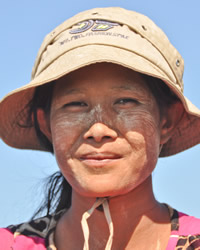Chaungtha in Myanmar (Burma)

Photo Source:
Mark Fischer - Flickr
Creative Commons
|
Send Joshua Project a map of this people group.
|
| People Name: | Chaungtha |
| Country: | Myanmar (Burma) |
| 10/40 Window: | Yes |
| Population: | 185,000 |
| World Population: | 185,000 |
| Primary Language: | Rakhine |
| Primary Religion: | Buddhism |
| Christian Adherents: | 0.10 % |
| Evangelicals: | 0.07 % |
| Scripture: | New Testament |
| Ministry Resources: | Yes |
| Jesus Film: | Yes |
| Audio Recordings: | Yes |
| People Cluster: | Burmese |
| Affinity Bloc: | Tibetan-Himalayan Peoples |
| Progress Level: |
|
Introduction / History
The Chaungtha people live in the nation of Myanmar, formerly known as Burma. Most live in the southwest region of the country near the Bay of Bengal. Other Chaungtha live throughout Myanmar. The name Chaungtha means, "people of the valley" or "people of the stream." The Chaungtha are historically and ethnolinguistically related to the Burmese, the dominant people of Myanmar. Because of this, in recent decades their identity has been eroded as an increasing number of Chaungtha choose to identify themselves as Burmese. These Chaungtha hope to benefit from being aligned with the majority ruling people in Myanmar. More and more young people are choosing to speak the Burmese language not Rakhine, the traditional language of the Chaungtha. It is difficult these days to identify and separate urban Chaungtha from the Burmese.
People in the southern part of the Mandalay Province still identify themselves as Chaungtha.
A few Bible portions are available in Rakhine. Many resources exist in Burmese, the national language that almost all Chaungtha are able to speak.
What Are Their Lives Like?
Like many peoples in South Asia, rice is the staple food for the Chaungtha. Some plant rice on mountain terraces, which is the ideal; while others practice "shifting cultivation," moving from one plot to another. Some of the other important crops grown include maize, cotton, tobacco, and opium poppies. In isolated areas, the government "looks the other way" when people grow opium poppies. Opium is turned into heroin. The amount of tobacco grown by the Chaungtha cannot meet the demands made by the many smokers in the region.
Most rural Chaungtha families raise some chickens, goats and pigs to supplement their diets. They sell any surplus of rice, tobacco or cotton to buy things they cannot make for themselves such as cell phones and appliances.
There is a big difference between rural and urban Chaungtha. In the cities the Chaungtha work in retail, manufacturing, construction, education, and trade. For the Chaungtha who live in villages, life is much like the lives of their ancestors. Life revolves around the village. They have a rich tradition of songs, poems, dances and festive dress that they wear on Buddhist holidays.
What Are Their Beliefs?
The central areas of Myanmar are among the most staunchly Buddhist in the nation. In the mountainous perimeter of Myanmar some rural Chaungtha practice Buddhism heavily mixed with animism. One profile of the Chaungtha states, "Buddhism was introduced into Myanmar in the fifth century; and today, the large majority of the Chaungtha are Buddhist. However, they have also maintained their traditional ethnic belief in evil spirits, or nats. They believe that these spirits can do almost anything in nature, such as preventing floods and other natural disasters."
Buddhism is the major world religion based on the teachings of Siddhartha Gautama or the Buddha, who lived in the 6th and 5th century BC in ancient India. The Buddha taught the Four Noble Truths by which one can gain spiritual knowledge and escape the endless cycles of reincarnation. Theravada, one of the two major branches of Buddhism, declares that by following the Noble Eightfold Path of right intentions and right actions that a Buddhist can achieve nirvana or a state of freedom and salvation.
To most Buddhists, however, these things have far less meaning than their traditional beliefs, which are usually animistic. In animism, evil spirits must be appeased through prayers, sacrifices and rituals. Buddhism allows people to mix Buddhist teachings with traditional religion.
Two of the important Buddhist yearly holidays are Vesak, the Buddha's birthday celebrated in May or June and Bodhi Day, the holiday in December or January which commemorates the day that the historical Buddha experienced enlightenment under a Bodhi tree.
What Are Their Needs?
There are only a few hundred Chaungtha followers of Christ in Myanmar.
Rural Chaungtha often lack access to modern medicine. Teams of believers can come and demonstrate the love of God is practical ways. Some isolated villages do not have electricity. Christians can come and install solar panels. Most of all, the Chaungtha need to hear the good news about Jesus Christ. He alone can forgive their sins and free them from their fear of evil spirits.
Prayer Points
Ask the Lord to send loving workers to share the gospel with the Chaungtha of Myanmar.
Pray that Christian resources become available in the Rakhine language, the heart language of most Chaungtha.
Pray the Lord convicts Chaungtha leaders of their personal sin and their need for the Savior.
Pray the Lord raises up a growing church movement among the Chaungtha people in this decade.